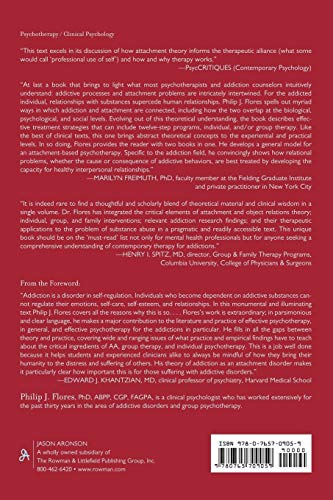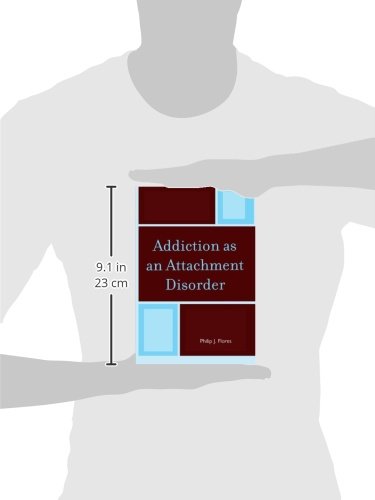Customer Services
Copyright © 2025 Desertcart Holdings Limited
Desert Online General Trading LLC
Warehouse # 7, 4th Street, Umm Ramool, Dubai, 30183, Dubai




Addiction as an Attachment Disorder
T**D
1 step forward, 2 steps back: More about AA than Attachment; Blames Parents Too Much
The thesis of this book is that addiction is a disorder of an individual's ability to have healthy attachments, or primary, intimate relationships. Starting from birth, everyone needs to have two basic things for a secure attachment: a secure base and a safe haven. A secure base is a supportive relationship that gives you the security from which to explore the world and face risks. A safe haven is a supportive relationship to turn to for help when facing stress or crisis in order to manage our emotions.When we fail to have secure relationships, we often try to find these needs in the wrong ways. We might use drugs or alcohol to manage our emotions or to give us a sense of confidence. This in turn destroys our relationships further. Thus, we have insecure attachment styles, when we are either avoidant/dismissing (counterdependent) or anxious/preoccupied or both. Dr. Flores alludes to the fact that addicts tend to be emotionally avoidant or counterdependent.The book makes a good point that 12 step groups like AA help in fostering healthy attachments, which are important for an addict's recovery, though I felt the book was more of a promotion for Alcoholics Anonymous rather than expanding on attachment theory and how to treat addiction--it tried too hard to fit research on attachment into the 12-steps philosophy, though I do believe the 12 steps is very helpful. For example, I like the principles of surrendering control of our lives to a higher power as a way to achieve serenity and recognize that we have little control over our lives, though the book doesn't get much into that.I like the author's point that addicts must learn they are not Gods (p. 98-99), as they have an "illusion of control." This is something I tell my clients all the time. He points out an existential approach that recognizes our human limits and need for others. He also criticizes Rene Descartes' mind-body dualism as incompatible with the research on the biology of emotion and attachment (106)--our emotions are stored and expressed physically. I liked the quote from Darwin (1871) that we need each other for survival: "For with those animals which were benefited by living in close association, the individuals which took the greatest pleasure in society would best escape various dangers: whilst those that cared least for their comrades and lived solitary would parish in greater numbers." Dr. Flores also quotes Stern (1985): "The essential state of human existence is togetherness rather than aloneness, with a most basic sense of connectedness, affiliation, attachment and security as givens." This reminds me of a quote I use from Genesis 2: "It is not good for man to be alone."Dr. Flores points out that our society oftentimes puts too much emphasis on individualism and independence at the expense of our need for attachment. Our society damages children when we teach them to just get over their attachment injuries. Perhaps these are reasons why we seem to have a growth of addictions and personality disorders in the past decades. Dr. Flores is also interested in the links between addiction and narcissism as both seem to be due to deficits in self-esteem, which may be caused by shame or relationship traumas.While Dr. Flores does not lay out many specifics for what an attachment-oriented therapy for addicts would look like, he does give some pointers. His primary treatment goal for addicts in recovery is to help them learn how to have secure attachments and to experience attachments because experiencing (experiential therapy) makes more of a difference at the implicit memory / emotional level. I affirm him on this as this is also my primary goal for therapy with addicts. Treatment such as individual and group therapy as well as AA can accomplish these by helping clients to be more emotionally aware and available in relationships and by fostering new attachments.As a family therapist who treats addicts from an attachment perspective, I truly believe in the premise of the book that addiction should be treated as an attachment disorder, but perhaps I was hoping for too much. I felt that some of the theoretical presentation was diluted by other theories, particularly terminology from object relations theory, which is more psychodynamic, though it is a precursor of attachment theory. The book also read too much like a dissertation's literature review and lacked the balance that comes with either being exposed to a variety of literature or experience in the field. Much of the research was dated. For example, I felt that the book blames parents too much when I have seen the influence of siblings and especially previous relationships partners on our attachment styles. It also glosses over the fact that not everyone uses drugs or alcohol because of a bad childhood. Many times, the initial use is just for fun, though it becomes a maladaptive tool for managing relationships. An addict may have just made a bad choice, or associated with the wrong person, and it may have nothing to do with his or her parents. On the other hand, an addiction will become an attachment and destroy a person's ability to have healthy, secure attachments with people, which is why I still believe it is an attachment disorder. My point is that this book puts too much blame on parents.The book was somewhat contradictory. On one hand, it says that "Someone can be attached and not be dependent" (p. 88) which is a bad assumption based on the theory. If one is to have a secure attachment, one MUST be at least interdependent. Avoidance (counterdependence) goes against secure attachment. But then it goes on to say that dependency isn't bad. So, which is it? Research in attachment theory recognizes and validates a healthy dependency, as long as a person is not basing their self-worth on the other person and is anxiously preoccupied in the other that it becomes controlling (codependence). Some emotional dependence is naturally a part of a relationship. Relationships will put us at risk of getting hurt, but that's a risk we must take.While I like the thesis of Dr. Flores' book, I might recommend other books instead, like Dr. Dayton's book "Emotional Sobriety."
S**O
Says Nothing About Attachment Theory To Sell You Something About AA. "Literature" Is A Con Nowdays.
This looks like (soon) a wannabe researcher's attempt to promote the AA approach set, and therefore his academic standing, by attaching perhaps two infertile Attachment Theory allusions (using a mask of academic conceit enhanced with added significance to repetition). Or maybe really just one full (repeated) allusion and not anything contributed. This is not what it's marketed to be, not even seeding one internally provocative reflection about AA, except maybe for the most mechanically induced orientation. Sobering, indeed.
R**S
This book is a clinical book but very accessible to ...
This book is a clinical book but very accessible to the informed lay person. This is a very important book. I help me personally and helped me understand the genesis of addiction. So well written. So important. Also just fascinating to read.
J**N
Flores does a great job of reviewing and expelling attachment theory
Flores does a great job of reviewing and expelling attachment theory. It is obvious that his work is in the chemical dependency field and should be mandatory ready for those in addictions, especially those not familiar with attachment theory.
R**S
Groundbreaking work on attachment.
This is one of my favorite books on understanding the struggle and challenge of addiction. Behaviors will start to make sense and solutions will begin to be revealed. This book is recommended to all therapists working in the field of addictions and anyone who craves a deeper understanding of what makes people tick. R. Williams, coauthor of The Mindfulness Workbook for Addiction.
E**E
If this book were a man then I would marry him!
The only work on addiction which has ever made complete sense to me. I am so grateful for this work, I believe it will likely help save lives. I hope I get the chance to work more with addictions and attachment, and I strongly urge others working in the field to buy this book.
K**.
Very good book
I haven't had a chance to read the whole book, but what I have read has been excellent. The book has really helped me to understand addiction, and makes total sense. The only thing is you need to have a dictionary with you while you read it.
C**S
Great Value
As advertised, wonderful condition.
P**E
great book
Excellent book thoroughly explains how attachments style can have an effect on how we develop relationships throughout our lifes and can have an impact on addiction. Helps understand a clients pathology and can assist in formulating a treatment plan.
M**A
A book anyone interested in addiction will need to take notion of
In this book Flores integrates different notions about addiction, by explaning the key concept of attachment and addiction and how attachment and addiction influence eachother.All practical implications of his theory are clearly pointed out which leads to a complete handbook that both those interested in theoretical issues about addiction as well as clinicians working with addicted clients in clinical practice will benefit from.
D**Y
Addiction Treatment Book
This is a fantastic book, I would highly recommend any person working with people recovering from addiction to read this, it is truly inspiring and bang on the money in my opinion!
D**E
A well written text
I would recomend this text for clinicians working with addictions. It is psychodynamically oriented and intigrates attachment, narcissim and addictions.
D**N
Five Stars
Well worth a read!
Trustpilot
1 month ago
2 months ago